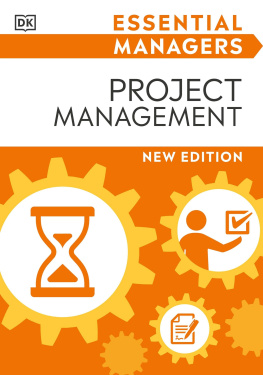
A Practical Guide to Dealing with Difficult Stakeholders
This book is dedicated to
Liliana, Max and Jamie (JH)
My parents (Julia and James), Shirl, Sophie, Chlo, Mollie, Rebecca, Vicki and Alex (DB)
Nolle, Edward and William (RJ)
A Practical Guide to Dealing with Difficult Stakeholders
JAKE HOLLOWAY
Senior Management Consultant, Xceed Group
DAVID BRYDE
Professor of Project Management, Liverpool John Moores University
ROGER JOBY
Managing Director, R&NR Consulting Ltd

First published 2015 by Gower Publishing
Published 2016 by Routledge
2 Park Square, Milton Park, Abingdon, Oxon OX14 4RN
711 Third Avenue, New York, NY 10017, USA
Routledge is an imprint of the Taylor & Francis Group, an informa business
Copyright 2015 Jake Holloway, David Bryde and Roger Joby
Jake Holloway, David Bryde and Roger Joby have asserted their right under the Copyright, Designs and Patents Act, 1988, to be identified as the authors of this work.
All rights reserved. No part of this book may be reprinted or reproduced or utilised in any form or by any electronic, mechanical, or other means, now known or hereafter invented, including photocopying and recording, or in any information storage or retrieval system, without permission in writing from the publishers.
Notice:
Product or corporate names may be trademarks or registered trademarks, and are used only for identification and explanation without intent to infringe.
British Library Cataloguing in Publication Data
A catalogue record for this book is available from the British Library
The Library of Congress has cataloged the printed edition as follows
Holloway, Jake.
A practical guide to dealing with difficult stakeholders / by Jake Holloway, David Bryde and Roger Joby.
pages cm. -- (Advances in project management)
Includes bibliographical references and index.
ISBN 978-1-4094-0737-9 (pbk.)
1. Project management. 2. Teams in the workplace--Management. I. Bryde, David.
II. Joby, Roger. III. Title.
HD69.P75H655 2015
658.404--dc23
2015003789
ISBN 9781409407379 (pbk)
Contents
There are many different types of people, or Stakeholders, involved in your project; which in this book is always the Project. These include Sponsors and other senior managers, the project Team and internal or external Customers or Contractors not to mention other groups or individual Gatekeepers within your organisation, such as operations, finance and project or service management process owners.
All of them have different needs, objectives, responsibilities and priorities. Indeed, your project will not necessarily be at the very top of their agenda. It is a disturbing realisation that, for any number of personal or professional reasons, some of them may not be as co-operative and helpful as you want or even want your project to succeed. The reality of project management is that Stakeholders can be difficult.
This is the first book to focus on the reality of how the individual and group behaviour of your project Stakeholders can and will have a massive impact on the success, both real and perceived, of the Project. The focus of our analysis is as much informed by social psychology as by pragmatic project management experience. It provides a way forward for dealing with unhelpful or difficult stakeholder behaviour and it charts a path to achieve the best outcome for your project.
You may get lucky and have a perfect set of supportive, competent Stakeholders to work with, allowing you to concentrate on the Project, rather than on having to deal with politics and conflict. However if, like us, you are not always so lucky, then this book offers insights, tips and techniques designed to help you through the difficulties you may encounter.
This book describes some of the common stakeholder types and associated unhelpful or difficult behaviour profiles that you often come across on projects. It also provides practical ideas, techniques and methods that will help you to effectively manage their impact on the Project. It is designed for dipping in to, as and when you need it, as you encounter the different situations it describes and also to be read chapter by chapter to give an overall view of project management from the perspective of various stakeholder types. Our ideas are not new or untried we have drawn heavily not just on our experience of involvement in hundreds of projects but on theories and research from social psychology that illustrate how and why people behave as they do.
Jake Holloway
David Bryde
Roger Joby
We would like to thank the following people for taking the time and effort to give us valuable feedback, guidance and advice in the writing of the book: Anne Holloway, Guy Richardson, Paula Alonso, Kevin Raum, Simon Potter and Algis Kuliukas.
We would also like to thank Jonathan Norman at Gower Publishing for his advice, guidance and patience, from the initial conception of the idea for the book through to its final publication.
We would also like to acknowledge the many academics, authors and practitioners who have influenced our thinking over the years. Prominent amongst these are: John Adair, Roger Atkinson, Stephen Carver, David Cleland, Roland Gareis, Steve Jones, Ralph Levene, Niccol di Bernardo dei Machiavelli, Harvey Maylor, Peter Morris, Ralf Mller, Jeffrey Pinto, Peter Taylor, Rodney Turner, Steve Wake, Graham Winch and Mike Young. And finally, we wish to thank contemporary thinkers on the topic of project management from the world of social media: P.M.Blogger from The Tao of Project Management blog, Elizabeth Harrin from A Girls Guide to Project Management and Dan Rockwell from the Leadership Freak blog.
Jake Holloway
David Bryde
Roger Joby
CHAPTER 1
Project Stakeholders
Introduction
Every project manager knows instinctively that their role is as much about dealing with the people in and around their project as it is about project management methodologies, managing schedules, creating resource plans and generally being organised. While there is increasing focus in project management literature on the subject of Stakeholders, very little has been written about dealing with the variety of people-related problems that every project manager faces such as difficult internal or external Customers, de-motivated Teams, aggressively unhelpful senior managers, lazy project Sponsors and unhelpful Gatekeepers.
Conventional textbooks take a fairly mechanistic perspective in seeing that Stakeholders, including those that might be difficult and working against The Project, can be dealt with simply by following a defined process. But do these process-oriented stakeholder engagement strategies work in the real world? Do they deal with behaviours such as jealousy, manipulation, undermining, mutiny and demotivation? Will they help you persuade everyone that your project is a success, whether it is or not?
This practical and informative guide is about the challenges of dealing with difficult and unhelpful people, or Stakeholders, at every level of The Project, from project Sponsors to Team members. It draws on the experience of three experienced project managers with hundreds of projects under their belts and backs up their pragmatic observations and suggestions with underpinning references to social psychology theory and research.










